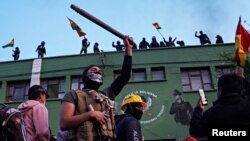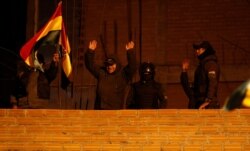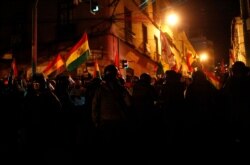Dissension appeared to be spreading in police forces across Bolivia Friday as opposing sides in the country’s political divide held fast to their positions after 17 days of violent protests over the legitimacy of President Evo Morales’ claimed reelection.
Defense Minister Javier Zabaleta said a “police mutiny occurred in a few regions,” but he rejected the idea of a military intervention “at this time.”
The disputed results of the Oct. 20 election have triggered a wave of protests across Bolivia, which have resulted in three deaths and more than 300 injuries.
Earlier in the day, opposition leader Luis Fernando Camacho vowed not to leave the capital of La Paz until Morales personally accepts a resignation letter drafted for him. At a separate public event, Morales repeated that he is not resigning.
In the evening, a small group of police officers staged a rebellion in the central city of Cochabamba, apparently demanding the resignation of their commander, who has been accused of siding with Morales’ supporters during clashes this week that left one person dead and more than 100 injured. The 18 officers stood on the roof of the special operations tactical unit, waving flags and singing the national anthem as a large crowd of people in the street cheered.
Hundreds of residents in other cities then clamored outside local police stations urging officers to “follow their example.” Police in Santa Cruz, an opposition stronghold, affixed a sign on their station saying they were in revolt. Police officers in other cities left the streets and returned to their stations, without explaining why.
Morales convened an emergency meeting with his ministers and military high command to analyze the situation.
“There is no order. There will be no military operation at this time. It’s discarded,” Zabaleta said after the meeting.
Gen. Yuri Calderon, head of the national police, had previously denied that a police rebellion was under way and called the Cochabamba incident isolated.
“There is normalcy in the rest of the country and we hope that services will resume,” he said.
Later, Morales went on Twitter to warn that “our democracy is at risk from the coup d’etat put in place by violent groups that are attacking the constitutional order.” His government issued a statement claiming that an opposition plot to oust the president was being led by Camacho and former President Carlos Mesa, who finished second in the Oct. 20 election.
There was no immediate comment from either Camacho or Mesa.
Morales declared himself the outright winner even before official results indicated he obtained just enough support to avoid a runoff with Mesa. But a 24-hour lapse in releasing vote results fueled allegations of fraud by the opposition.
The Organization of American States is conducting an audit of the election count and their findings are expected Monday or Tuesday. The opposition says it will not accept the results because they were not consulted on how the process would unfold.
Morales’ bid for re-election was controversial before it began. The former union leader, and Bolivia’s first indigenous president, has shepherded significant economic growth and an overhaul of the constitution. But he refused to accept the results of a referendum upholding term limits. The country’s constitutional court later ruled that term limits violated his human right to run for office, and the electoral court ultimately accepted his candidacy for a fourth term.






